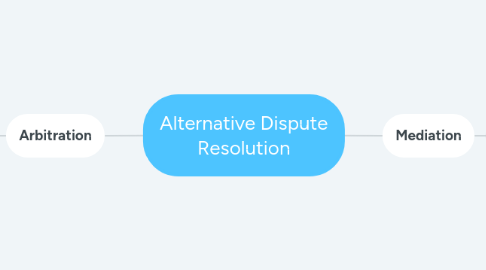
1. Arbitration
1.1. Advantages
1.1.1. A decision is made sooner because the arbitrator ultimately decides on a resolution
1.1.2. It is public record and therefore less likely for the offense to occur again
1.1.3. The arbitrator offers and unbiased point of view on the matter and chooses the resolution that they see as fair
1.2. Disadvantages
1.2.1. The parties have no control over the decision that is made and can not appeal the decision once it is decided.
1.2.2. Arbitration can lead to tension and result in damaged working relationships which can affect the work environment
1.2.3. The details of the arbitration is public record and can be viewed by employees/employers
1.3. Qualifications
1.3.1. A degree in law is the most common but a degree in business administration or Human Resources is also ideal (Frost, Shelley, 2018)
1.3.2. Experience in law and/or business for at least eight years, ten for senior positions in larger corporations (Laws, n.d.)
1.3.3. An arbitrator has to remain neutral and be able to make fair decisions based on the information with no personal bias
1.3.4. A strong understanding of laws and legal requirements as well as ethics
1.3.5. Certified in arbitration which puts the arbitrator on a membership list
2. Mediation
2.1. Advantages
2.1.1. Costs less than arbitration or litigation with the avoidance of court fees and accompanying legal fees
2.1.2. The parties involved have more control over the situation and can come to their own conclusion
2.1.3. The matter remains private among the parties involved as well as the mediator so it can be resolved without public knowledge
2.2. Disadvantages
2.2.1. It can become costly if it is drawn out and a decision is not being made quick enough
2.2.2. Because both parties are in control of the result it can be more difficult to come to a conclusion if they can not negotiate
2.2.3. Mediation is a private matter which can lead to the offending party to repeat the offense as it is not on public record
2.3. Qualifications
2.3.1. A degree in any field of study will suffice, but it is preferred that the degree be in psychology, conflict management, communication or something of the like (Kelly, Bob n.d)
2.3.2. Experience in watching a mediation or participating in a mediation whether it be solo or with another mediator (Kelly, Bob n.d)
2.3.3. Great listening skills, communication skills and conflict management skills with a strong understanding of ethics
2.3.4. A state certification in mediation which can be obtained in a 20 hour course (Kelly, Bob n.d.)
2.3.5. The mediator is not familiar with the parties involved and is in no way personally affiliated with the issue
